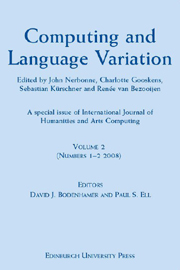Book contents
- Frontmatter
- Contents
- From the Editors
- Notes on Contributors
- 1 Introduction: Language Variation Studies and Computational Humanities
- 2 Panel Discussion on Computing and the Humanities
- 3 Making Sense of Strange Sounds: (Mutual) Intelligibility of Related Language Varieties. A Review
- 4 Phonetic and Lexical Predictors of Intelligibility
- 5 Linguistic Determinants of the Intelligibility of Swedish Words among Danes
- 6 Mutual Intelligibility of Standard and Regional Dutch Language Varieties
- 7 The Dutch-German Border: Relating Linguistic, Geographic and Social Distances
- 8 The Space of Tuscan Dialectal Variation: A Correlation Study
- 9 Recognising Groups among Dialects
- 10 Comparison of Component Models in Analysing the Distribution of Dialectal Features
- 11 Factor Analysis of Vowel Pronunciation in Swedish Dialects
- 12 Representing Tone in Levenshtein Distance
- 13 The Role of Concept Characteristics in Lexical Dialectometry
- 14 What Role does Dialect Knowledge Play in the Perception of Linguistic Distances?
- 15 Quantifying Dialect Similarity by Comparison of the Lexical Distribution of Phonemes
- 16 Corpus-based Dialectometry: Aggregate Morphosyntactic Variability in British English Dialects
6 - Mutual Intelligibility of Standard and Regional Dutch Language Varieties
Published online by Cambridge University Press: 12 September 2012
- Frontmatter
- Contents
- From the Editors
- Notes on Contributors
- 1 Introduction: Language Variation Studies and Computational Humanities
- 2 Panel Discussion on Computing and the Humanities
- 3 Making Sense of Strange Sounds: (Mutual) Intelligibility of Related Language Varieties. A Review
- 4 Phonetic and Lexical Predictors of Intelligibility
- 5 Linguistic Determinants of the Intelligibility of Swedish Words among Danes
- 6 Mutual Intelligibility of Standard and Regional Dutch Language Varieties
- 7 The Dutch-German Border: Relating Linguistic, Geographic and Social Distances
- 8 The Space of Tuscan Dialectal Variation: A Correlation Study
- 9 Recognising Groups among Dialects
- 10 Comparison of Component Models in Analysing the Distribution of Dialectal Features
- 11 Factor Analysis of Vowel Pronunciation in Swedish Dialects
- 12 Representing Tone in Levenshtein Distance
- 13 The Role of Concept Characteristics in Lexical Dialectometry
- 14 What Role does Dialect Knowledge Play in the Perception of Linguistic Distances?
- 15 Quantifying Dialect Similarity by Comparison of the Lexical Distribution of Phonemes
- 16 Corpus-based Dialectometry: Aggregate Morphosyntactic Variability in British English Dialects
Summary
Abstract In this experimental study, we aim to arrive at a global picture of the mutual intelligibility of various Dutch language varieties by carrying out a computer-controlled lexical decision task in which ten target varieties are evaluated – the Belgian and Netherlandic Dutch standard language as well as four regional varieties of both countries. We auditorily presented real as well as pseudo-words in various varieties of Dutch to Netherlandic and Belgian test subjects, who were asked to decide as quickly as possible whether the items were existing Dutch words or not. The experiment's working assumption is that the faster the subjects react, the better the intelligibility of (the language variety of) the word concerned.
INTRODUCTION
Research framework
When speakers of different languages or language varieties communicate with each other, one group (generally the economically and culturally weaker one) often switches to the language or language variety of the other, or both groups of speakers adopt a third, common lingua franca. However, if the languages or language varieties are so much alike that the degree of mutual comprehension is sufficiently high, both groups of speakers might opt for communicating in their own language variety.
This type of interaction between closely related language varieties, which Haugen (1966) coins semicommunication and Braunmüller and Zeevaert (2001) refer to as receptive multilingualism, has been investigated between speakers of native Indian languages in the United States (Pierce 1952), between Spaniards and Portuguese (Jensen, 1989), between speakers of Scandinavian languages (Zeevaert, 2004; Gooskens, 2006; Lars-Olof Delsing, 2007) and between Slovaks and Czechs (Budovičová, 1987).
- Type
- Chapter
- Information
- Computing and Language VariationInternational Journal of Humanities and Arts Computing Volume 2, pp. 101 - 118Publisher: Edinburgh University PressPrint publication year: 2009



